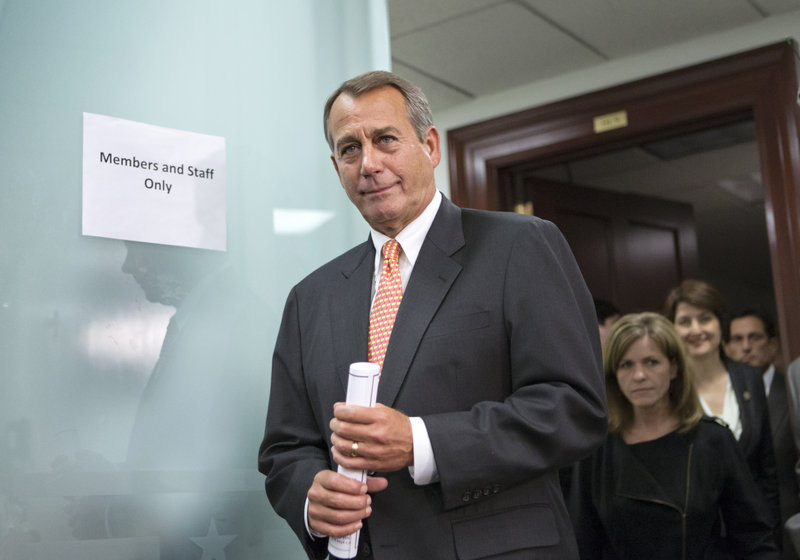WASHINGTON – House Speaker John Boehner abruptly abandoned a partisan plan to avert the year-end “fiscal cliff” late Thursday after failing to persuade conservative Republicans to extend tax cuts for the vast majority of Americans and let tax rates rise for millionaires.
With more than four dozen House Republicans either on the fence or signaling their opposition, Boehner, R-Ohio, and other Republican leaders shuttered the House floor moments before the vote was scheduled to begin. They disappeared into Boehner’s office and then summoned rank-and-file lawmakers to an emergency meeting that ended with a terse statement calling off the vote.
Boehner’s sudden move throws into chaos the efforts to avoid the fiscal cliff, just 11 days before more than $500 billion in automatic tax increases and spending cuts are set to take effect. Unless Congress acts, many economists predict the nation will again descend into a recession.
The House is now recessed until after Christmas, and the Senate is scheduled to meet for only a few hours Friday afternoon before members leave town until Dec. 27.
Boehner’s inability to rally the House behind a proposal that would have preserved tax cuts for more than 99 percent of Americans — while raising rates for about 400,000 wealthy families — casts doubt on his ability to pass any alternative to the fiscal cliff. It also underscores the limited clout that he and his leadership team wield within the Republican caucus.
Boehner opened the emergency meeting with his lawmakers by announcing that he would deliver the prayer, an unusual move. He then launched into the familiar lines: “God, grant me the serenity to accept the things I cannot change, the courage to change the things I can, and the wisdom to know the difference.”
Moments later, Boehner’s office issued a written statement.
“The House did not take up the tax measure today because it did not have sufficient support from our members to pass. Now it is up to the president to work with Reid on legislation to avert the fiscal cliff,” the statement said, referring to Senate Majority Leader Harry Reid, D-Nev.
“The House has already passed legislation to stop all of the January 1 tax rate increases and replace (automatic spending cuts) with responsible spending cuts that will begin to address our nation’s crippling debt. The Senate must now act.”
After the meeting, Boehner and other Republican leaders left the Capitol without answering reporters’ questions. House Majority Leader Eric Cantor, R-Va., announced that his chamber was leaving town until “after the Christmas holiday, when needed.”
The vote on “Plan B” was perhaps the most consequential test of Boehner’s leadership since he took control of the House early last year. Persuading a majority of Republicans to cast a politically treacherous vote to permit higher taxes could have enhanced his leverage with President Obama in future talks to secure a broad plan to rein in the national debt, Republicans said.
Failure, however, immeasurably weakens Boehner’s hand — and could imperil his hold on power.
Until earlier this week, Boehner had been pursuing an entirely different course in hopes of striking a deal with Obama to save $2 trillion over the next decade. He offered to raise $1 trillion in fresh revenue, in part by raising tax rates for millionaires, and he offered to delay a fight over the federal debt limit for one year — both major Republican concessions.
On Monday, he abruptly switched gears, complaining that the president had not made concessions of equal size and significance to rein in the cost of federal health and retirement programs. Obama also insisted on delaying a debt-limit fight for two years, a position that Republican leaders considered unacceptable.
Although Boehner had insisted earlier in the week that talks with Obama would continue, he announced that he was pursuing Plan B, a bare-bones bill to extend a variety of expiring tax breaks for the vast majority of Americans. The measure would permit taxes to rise on income over $1 million — affecting about 400,000 households — but by extending tax cuts for everyone else, it would significantly soften the economic blow of the fiscal cliff.
As the week wore on and House leaders scrambled for votes, they amended the measure to raise even less revenue. And they announced plans to hold a vote on a separate bill that would cancel automatic spending cuts scheduled to hit the Pentagon in January and slice more deeply into domestic programs.
That measure narrowly won House approval late Thursday on a vote of 215 to 209.
“The Republicans are in an untenable situation,” said Rep. Dan Burton, R-Ind. “If we don’t do anything, we go over the fiscal cliff. And then the president will come back. … And if the economy goes to hell, he’s going to say it was the Republicans’ fault.”
Send questions/comments to the editors.


